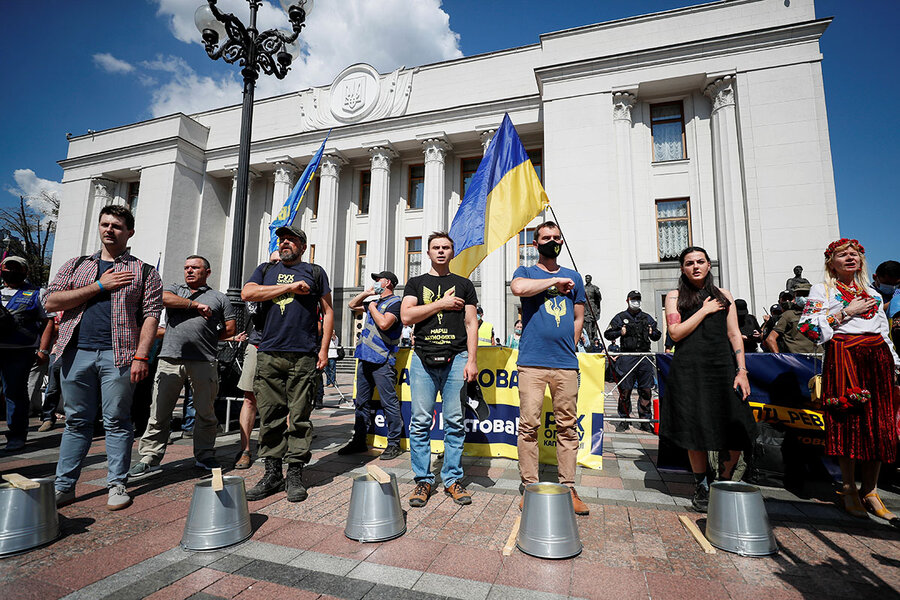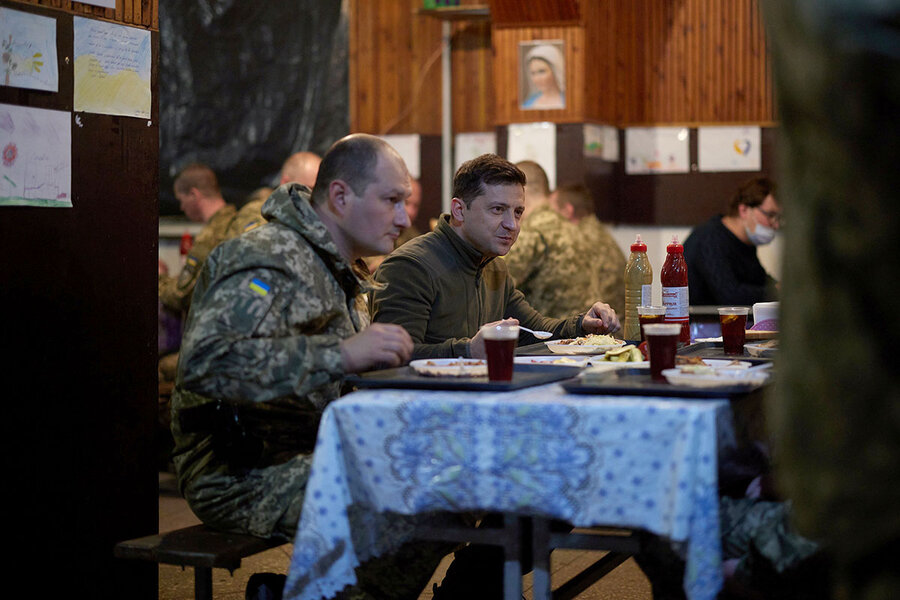Language in Ukraine: Why Russian vs. Ukrainian divides so deeply
Loading...
| Kyiv, Ukraine
Ukrainian and Russian are linguistic siblings that use almost identical Cyrillic alphabets. But as the political divide between their namesake regions has become a chasm, so too has the split within Ukrainian society between the speakers of each language.
The use of one language over the other now polarizes the public and is used as a tool by politicians. And as new laws come into effect promoting Ukrainian and relegating Russian to secondary status, Ukrainians’ choice of language is feeding into biases about their loyalty – or hostility – toward their country.
Why We Wrote This
Though the Ukrainian and Russian languages are closely related, the sociopolitical divide between their speakers couldn’t be wider in Ukraine, due to the prejudices and values that have been attached to each language.
The France-sized nation of 41 million is multilingual. But Ukrainian has become dominant: Two-thirds of the population say it’s their mother tongue. Still, only 53% said that they “mostly speak it” at home, while 29% prefer Russian.
But a controversial “language law” has made Ukrainian mandatory for all public service workers, isolating speakers of Russian. “Russian is totally out of official use and stigmatized, and Russian-language media face difficulties and are marginalized,” says sociologist Nikolay Mitrokhin.
That is tarring Ukrainians who feel no loyalty to Russia. “We hate Putin just as hard as any Ukrainian speaker,” says Valentina, from Odessa, “and the fact that Russian is our mother tongue doesn’t make us Moscow spies.”
It wasn’t fighting Russian-speaking separatists in Ukraine that spurred Roman Nabozhniak to stop speaking Russian. It was being misidentified on vacation as a Russian.
Mr. Nabozniak was one of thousands of Ukrainian volunteers who fought rebels in the Moscow-leaning Donbass region, who rose against the central government in Kyiv in 2014 citing in part its “violation” of their right to speak Russian. Backed by Russian weaponry and volunteers, the separatists forcibly carved out two “people’s republics,” where anyone speaking Ukrainian could be thrown in what rights groups and survivors call “concentration camps.”
Mr. Nabozniak and his comrades in arms, on the other hand, were linguistically mixed. Some volunteers came from western, Ukrainian-speaking regions. But others were from Kyiv or, like Mr. Nabozniak, from the central city of Cherkasy, where most of the population still speaks Russian with an accent somewhat similar to the Texan drawl. Russian was the dominant language in much of Ukraine during its time as a Soviet republic (which ended in 1991), while Ukrainian was seen as a parochial dialect.
Why We Wrote This
Though the Ukrainian and Russian languages are closely related, the sociopolitical divide between their speakers couldn’t be wider in Ukraine, due to the prejudices and values that have been attached to each language.
“I spoke Russian every day, even during the war,” says Mr. Nabozhniak, whose 14-month military service ended in 2016.
But when he was vacationing in India a year after leaving the military, the hotel staff heard him speak Russian. “Indians started treating me like a Russian, and to me, it was unacceptable,” says Mr. Nabozhniak. After he got back from his trip, he started speaking only Ukrainian or English – and so did the staffers of Veterano Brownie, a cafe in central Kyiv he owns – even if it meant losing customers or earning an unfavorable review.
Since then, the political divide between Ukraine and Russia, which supports the breakaway Donbass region, has become a chasm. And as that divide has widened, the two countries’ respective tongues have become emblems of the split, not just between the two nations, but within Ukrainian society.
Though Ukraine has long been home to speakers of both Ukrainian and Russian, two linguistic siblings that use almost identical Cyrillic alphabets, the usage of one language over the other now polarizes the public and is used as a tool by politicians. And as new laws come into effect promoting Ukrainian and relegating Russian to secondary status, Ukrainians’ choice of language is feeding into biases about their loyalty – or hostility – toward their country.
Native tongues
The France-sized nation of 41 million, sewn together from the fragments of the Russian, Austro-Hungarian, and Ottoman empires, is far from bilingual. Ukraine’s minorities speak Yiddish, Greek, Hungarian, two Turkic tongues, and Romani. But almost 30 years after Ukraine’s independence, Ukrainian has become dominant: Two-thirds of the population say it’s their mother tongue. Still, only 53% say that they “mostly speak it” at home, while 29% prefer Russian, according to a survey commissioned by the Space of Freedom nongovernmental organization last November.
The linguistic divide went right through the two-bedroom Cherkasy apartment where Mr. Nabozhniak grew up. His mother, Natalia, spoke Russian to him, and his father, Yuri, spoke to him in Ukrainian. Such bilingual conversations have been common throughout Ukraine for decades.
But since January, a controversial “language law” has made Ukrainian mandatory for all public service workers – changing conversations in many shops, government offices, and hospitals from Russian-only to bilingual. The law was signed in 2019 by then-President Petro Poroshenko, and followed steps that banned pro-Kremlin television networks and books published in Russia.
Volodymyr Zelenskyy, the current president, had seemed like he would reverse aspects of the language law. During his 2019 election campaign, he often spoke Russian and pledged to revise the law. He also grew up in a Russian-speaking family in southeastern Ukraine, and led a comic troupe that mixed Russian and Ukrainian in its shows and ridiculed the forced Ukrainization.
But the state pressure in favor of Ukrainian and against Russian has continued under Mr. Zelenskyy. In March, he said that Ukrainian is “fully protected.”
“Everyone who raises the issues of ethnicity, language, and church, these people just want temporary hype,” Mr. Zelenskyy said.
Government officials have largely kept in line with the president. There was only one top official – Interior Minister Arsen Avakov – who stuck to Russian in public speeches, but he resigned on July 15 after months of tensions with Mr. Zelenskyy.
Some public officials and lawmakers tried to soften the language law. Fifty-one lawmakers from both a pair of pro-Russian parties and Mr. Zelenskyy’s ruling Servant of the People party complained about certain provisions of the language law that ban the use of Russian and other “minority languages” in schools, but Ukraine’s Supreme Court dismissed their complaints last month.
And as of July 16, every television show and movie in a foreign language broadcast on Ukrainian television is required to be dubbed, or at least subtitled, in Ukrainian – even decades-old Soviet classics that many Ukrainians know by heart.
The culture minister, Alexander Tkachenko, said he tried to postpone the measure, arguing that it could be pricey for television channels and news outlets, especially when it comes to lengthy television series. “I am talking about a gentle Ukrainization,” Mr. Tkachenko told a news conference on July 8. But the Verkhovna Rada, Ukraine’s parliament, rejected his attempt. Officials have already reported and fined several television networks for showing content in Russian.
In the coming months, tens of thousands of government employees, including health professionals, law enforcement officers and judges, schoolteachers and university professors, will have to “confirm” their knowledge of Ukrainian by taking several written and oral tests. There have already been reports about bribes of up to $2,000 per language-proficiency certificate.
Linguistic biases
“Russian is totally out of official use and stigmatized, and Russian-language media face difficulties and are marginalized,” says Nikolay Mitrokhin, a sociologist at Bremen University in Germany who conducts dozens of interviews throughout Ukraine every year. “But spoken Russian remains the dominant language of communication everywhere except for Ukraine’s eight western regions.”
Other analysts see the law as a ploy to marginalize the kind of multiculturalism promoted in the European Union – and to ghettoize Russian-speaking Ukrainians. “The language law is a step to a new segregation and a hidden political apartheid,” says Kyiv-based analyst Aleksey Kushch.
Some Ukrainians do feel marginalized. “We hate Putin just as hard as any Ukrainian speaker, and the fact that Russian is our mother tongue doesn’t make us Moscow spies,” says Valentina, a cook from the southern city of Odessa. She asked not to use her second name because she fears ostracism for sounding “pro-Russian.”
“If you don’t like the language people speak or the books they read, you’re an invader,” said Vasily Pilipchuk, a salesclerk in the southeastern city of Mariupol, in 2019.
But linguistic bias over Russian and Ukrainian can cut both ways. In the breakaway regions in the east, pro-Russian separatists banned Ukrainian, and anyone speaking it there could end up in one of dozens of makeshift concentration camps where thousands of people are held without trial and face torture and even execution, says professor Ihor Kozlovsky.
The religious scholar spent almost 700 days in several such camps between 2015 and 2017 after organizing a series of pro-Ukrainian rallies in the city of Donetsk. He recounts a conversation with a Russian intelligence officer who tortured and lectured him on the “Russian world,” a “civilization” Ukraine has been – and has to be – part of.
“The officer told me, ‘There are no nations. There are civilizations, and the Russian world is a civilization, and for anyone who had been part of it, it does not matter what you call it, a Tatar or a Ukrainian, you don’t exist,’” says Dr. Kozlovsky.








